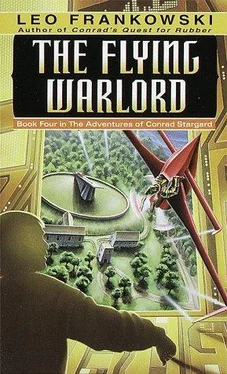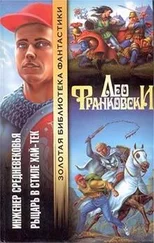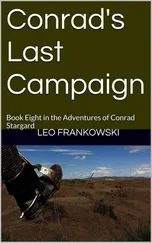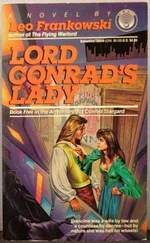Лео Франковски - The Flying Warlord
Здесь есть возможность читать онлайн «Лео Франковски - The Flying Warlord» весь текст электронной книги совершенно бесплатно (целиком полную версию без сокращений). В некоторых случаях можно слушать аудио, скачать через торрент в формате fb2 и присутствует краткое содержание. Жанр: Альтернативная история, на русском языке. Описание произведения, (предисловие) а так же отзывы посетителей доступны на портале библиотеки ЛибКат.
- Название:The Flying Warlord
- Автор:
- Жанр:
- Год:неизвестен
- ISBN:нет данных
- Рейтинг книги:4 / 5. Голосов: 1
-
Избранное:Добавить в избранное
- Отзывы:
-
Ваша оценка:
- 80
- 1
- 2
- 3
- 4
- 5
The Flying Warlord: краткое содержание, описание и аннотация
Предлагаем к чтению аннотацию, описание, краткое содержание или предисловие (зависит от того, что написал сам автор книги «The Flying Warlord»). Если вы не нашли необходимую информацию о книге — напишите в комментариях, мы постараемся отыскать её.
The Flying Warlord — читать онлайн бесплатно полную книгу (весь текст) целиком
Ниже представлен текст книги, разбитый по страницам. Система сохранения места последней прочитанной страницы, позволяет с удобством читать онлайн бесплатно книгу «The Flying Warlord», без необходимости каждый раз заново искать на чём Вы остановились. Поставьте закладку, и сможете в любой момент перейти на страницу, на которой закончили чтение.
Интервал:
Закладка:
But many of the problems had to be solved sequentially, rather than in parallel. We couldn't test bearing materials without a working engine, nor could we work on lubricants or carburetion or propellers. The first big snag was ignition, and the problem there was the lack of a decent electrical insulator for the spark coil. The damn things kept shorting out.
While this was going on, there were innumerable problems with the factories, since the entire upper management, everybody above the foreman level, was out playing soldier. And besides Three Walls, I still had to keep tabs on all the other installations, which were also running without their best men and women.
Then there was the problem of the barony that I had just been given. It was previously owned by my enemies, the Jaraslavs. These men had hated everything about me and as a result, they had refused to allow any of my innovations on their lands. Because of this, the barony was the most backward in the duchy. The spring crops were already planted when I got the place, so not much could be done in that direction until next year, but there were a lot of other things that needed doing.
The school system had to be extended into it. That meant more work for Father Thomas, who ran the schools, but not much for me. Along with the schools went our distribution system and the mails. Boris's job. Teaching the farmers about the new crops and machines? I managed to "borrow" two dozen of Count Lambert's more mature peasants, men with grown sons who would just as soon take over the family farm. I made these men my bailiffs and assigned farmland to them scattered over the barony, along with a complete set of the newest farm equipment, with the understanding that they had to teach their new neighbors about the new stuff.
Understand that none of these were trivial jobs. That barony was big! There were four thousand three hundred peasant families living on it. No wonder Baron Stefan had been able to ride around with solid gold trim on his armor!
As to the fifty-odd knights and their squires that were sworn to Baron Stefan, I pointed out to them that their previous liege lord had been killed in a fair fight when he was fully armed and on horseback. And that this deed had been done by scrawny and naked little Piotr, one of my students at the Warrior's school. If they wanted to swear to me, they had to go to the school, too. And there I was a school for their wives as well.
Those who had manors still kept them, but it was many years before they could do more than occasionally visit. They were in the army now!
All told, it was a rough summer and fall.
In the middle of this, my alchemist, a heretical Moslem named Zoltan Varanian, came to me with a vast grin on his face. He wanted to show me something in the valley I had set aside for the use of his people. He took me to a cave in the hills, which had centuries of bat droppings on the floor.
"You see?" he said. "We will no longer have to haul shit up here to make into your gunpowder, my lord! On this very floor is sufficient to make nine hundred tons of gunpowder! I have calculated it!"
This was extremely good news. Getting enough manure to meet the gunpowder quotas was a problem, and the peasants complained that we were taking the only thing they had to fertilize their fields. Furthermore, the manufacturing process for gunpowder was one of our major secrets, as were the ingredients that went into it. Having an internal supply of saltpeter eliminated one possible security leak. On top of that, why couldn't bat droppings be used as fertilizer? There were a lot of bat caves around.
We still had a problem with the sulfur needed, and were importing it from Hungary in the form of cinnabar, mercuric sulfide. We were just storing the mercury, except for a little that was used in thermometers, but it would find a use someday.
The annoying thing was that Poland has vast deposits of sulfur, but they are so far down that we couldn't get to them without some sophisticated drilling equipment that we hadn't had time to develop. Many of the ores we were mining were sulfides, and in roasting them, we were able to recover the sulfur dioxide and convert it to usable sulfuric acid. But taking sulfuric acid back to sulfur is harder than getting toothpaste back into the tube! As Zoltan put it, "Can the child be put back into the mother?" For the foreseeable future, we were stuck with imported sulfur.
I gave Zoltan my hearty congratulations, and two dozen huge bolts of Count Lambert's cloth as a bonus.
By fall, the team working on the zipper was successful, since all they had to do was duplicate the zipper on my sleeping bag, and this mollified Count Lambert somewhat, but the boys at Eagle Nest were disappointed with me. They had done their part and I had failed to do mine. I finally invited the entire senior class to Three Walls so that they could see the problems we were having with the aircraft engine and try their hands at solving some of them.
And the little bastards did!
A fourteen-year-old kid came up with an incredibly simple and efficient ignition system. Our cigarette lighters made a spark, didn't they? They worked on the principle of hitting a quartz crystal, didn't they?
So he made a spark plug with a hefty quartz crystal inside of it, which was struck by a little hammer connected by a linkage to the crankshaft. It didn't need insulation for the wires because there weren't any wires!
So we named the system after him, calling it the Skrzynecki ignition, and threw a party in his honor. What troubled me about it was the fact that I should have thought of that one myself. After all, I was the one who had designed our lighters in the first place. I just had to put it down to a mental blind spot.
It took a few months to beat down the other problems, but by Christmas we had an engine that could run for six hours without an overhaul and that was good enough for starters.
By spring they had six powered aircraft flying. It is astounding what a bunch of motivated kids can come up with!
Of course, the same electrical problems that plagued the engine also troubled the radio. To make a spark-gap transmitter, you have to have a spark. So I used a variation on the Skrzynecki ignition to power the transmitter. To transmit, somebody had to turn the crank so that a dozen little wooden hammers beat on a big quartz crystal, but that was no big problem.
Waxed paper and gold foil (the only really thin metal available) made a usable capacitor, a large, carefully made air core coil of bare wire served for a choke, and a long bare copper wire served as an antenna.
The receiver had a similar antenna connected with an identical coil and capacitor. This in turn went to a coherer, which was little more than a glass tube with iron filings in it. If a signal was picked up, the iron filings slightly welded themselves together and the resistance through them went way down. This let a low voltage current go through a relay which went "click" and tapped the coherer, shaking loose the iron filings to wait for another signal. It was a year and a half getting a pair of transceivers working that could send and receive over two dozen miles, and they weren't very dependable, requiring constant fiddling on the part of the operators, but they were good enough. We went into production with them.
About then, I somehow found time to polish up the books I had been writing. Over the years, I had tried to write down everything I could remember about science and modem technology, and over time these scattered notes had turned themselves into about two dozen books. Or perhaps I should say pamphlets, since none of them was more than three dozen pages long, and in fact the longest of them was the poetry I had remembered.
One was called Concerning Optics. Everything I knew in twenty-nine pages. Another was Power Transmission, eighteen pages. It was frustrating! Here was everything I remembered from seventeen years of formal education, and a lot of reading besides, all in one short stack of papers! Even then, some of them wouldn't be useful here for many years, and books like Computer Design, Programming and Semiconductors were filed for future publication. But Bridges, and Canals, Locks, and Dams could aid contemporary builders, and there was no reason to withhold the information. I got the stack over to Father Ignacy and ordered six thousand copies of each, with woodcut illustrations. He was awestruck, but said he'd start having it done.
Читать дальшеИнтервал:
Закладка:
Похожие книги на «The Flying Warlord»
Представляем Вашему вниманию похожие книги на «The Flying Warlord» списком для выбора. Мы отобрали схожую по названию и смыслу литературу в надежде предоставить читателям больше вариантов отыскать новые, интересные, ещё непрочитанные произведения.
Обсуждение, отзывы о книге «The Flying Warlord» и просто собственные мнения читателей. Оставьте ваши комментарии, напишите, что Вы думаете о произведении, его смысле или главных героях. Укажите что конкретно понравилось, а что нет, и почему Вы так считаете.




![Brian Jacques - [Flying Dutchman 01] - Castaways of the Flying Dutchman](/books/128851/brian-jacques-flying-dutchman-01-thumb.webp)






